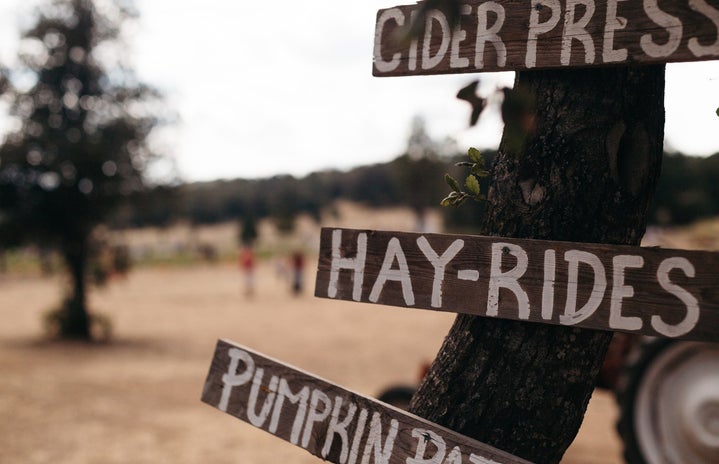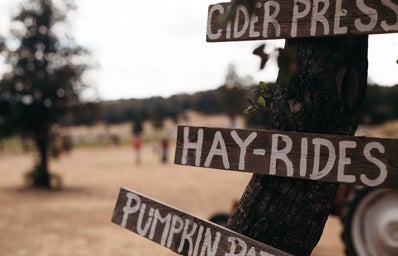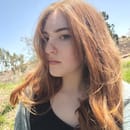Introduction
As the October season continues, the scariest monster of all should definitely be talked about: Time! Aging, endings, losses, depravations–all of these are the consequences of time! Over the Garden Wall is not the first show to metaphor time, but I think its an important one to mention because it takes inspiration of the death of a younger sibling and transforms it into a metaphor for the death of childhood.
The Brothers
The show begins with a melodious song hosting the lyrics of uncertainty. “If dreams can’t come true, why can’t you pretend?” This show is the maladaptive daydream of a possibility that never was. Wirt and his younger brother, who are lost and searing for home, are the first people to interact on the show. The parallelism between the lyric above and the first interaction alludes to the show being about the relationship between the two boys.
In later episodes, the theme of the “hero” takes root into the soil of the show. Wirt is told that he acted like a hero, and his younger brother asks if “[he] can be a hero, too.” Inadvertently, the responsibility of surviving and finding home is given to Wirt, and Greg is left with only the expectation of being a hero—he holds no actual obligation, but he wants to in order to imagine himself as a character. Wirt also sees this “heroism” as a character for him to fill out. He can pretend to be something he’s not.
But when challenges become increasing dangerous and equally increasingly bleak, Wirt loses hope in any chance of survival. He fulfills the Beast’s (whom I have not yet mentioned) prophecy chanted in the seventh episode, “all hope will be lost.” Greg, however, relying on his childish naiveite, now decides to become to hero and lead him and his brother back home. Due to this naiveite, however, Greg quickly falls into the hands of the Beast. Luckily, as the miniseries comes to an end, the boy is saved by Wirt, and the Beast is defeated, and all is, apparently, a happily ever after. Until, that is, the show ends, and the haunting song the played in the first question sums up the entire show as “the loveliest lies of all.” The happy ending is a lie, and Wirt never regained his expectations of survival and Greg was lost to the Beast who, in this observation, represents Death.
The Monstrous Time
The inspiration of an older brother losing his younger brother is merely a sad illusion to the deeper metaphor. Within these ten episodes, only three people are directly impacted by the Beast: Wirt, Greg, and the Woodsman (whom I have previously ignored). The Woodsman is enslaved to the Beast, believing that he is protecting his daughter. Wirt and Greg are being hunted by the Beast, unaware that they are even prey for the majority of the show.
Greg, the youngest, is ridiculous, constantly living in a reality impacted by his own colorful imagination. In the third episode, when someone tells him that the “word is a miserable place. Life isn’t fun,” his immediate response is “[doing his] part to make the world a better place.” This response is innocently one of a child, one who sees the light behind every shadow, and the rain during every drought. He represents childhood innocence.
Wirt, who is of high school age, is more awkward and judgmental of his brother’s ridiculousness. During the falling action, he even yells at his brother to “stop being so ridiculous.” He is more to the book, follow the crowd, don’t be different attitude. However, unlike the next character, he is, for the most part, not too worry of the Beast, unless someone brings the Beast up (then he gets worried). He represents young adults.
The Woodsman, however, is a father, and significantly older than the boys. All he does is in the name of his daughter, and he is commanded and directed by the Beast. At the end of the miniseries, he fights the Beast and his beaten down. He does arise again, but if the ending is all a lie, I think it is safe to assume that he never actually arose and was killed by the Beast. He represents old age, a person attempting to prolong his life either for selfish reasons, or for the sake of others (his daughter needing him, for example).
I have mentioned earlier that the Beast could represent Death, but, in this metaphor, he represents Time. He is the monster lurking in the dark, leaning over the shoulders of the old, and waiting for the youths to walk into his grasp. He may shorten one’s life, but death is simply a coincidence of Time. He kills Greg, the innocent child, but spares Wirt to mourn the death. Time came in, aged the child, and, with that aging comes the death of childhood innocence and imagination. It is lead to believe that an earlier statement is as sure as Time itself, “life isn’t fun.”
The End
The consequences of time are the loss of that light in the shadow, it’s the continuous drought with no expectation of rain. Over the Garden Wall covertly is about the consequences of aging, of the Beast watching, waiting, as the innocence and hope of childhood is killed and adults are left to mourn the loss of hopeful expectations.


